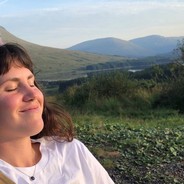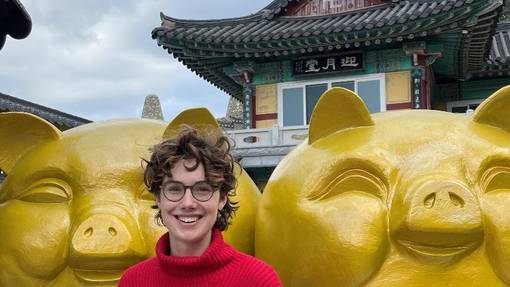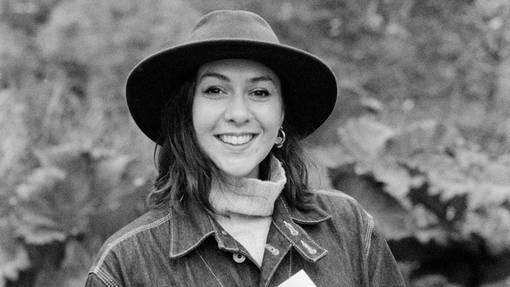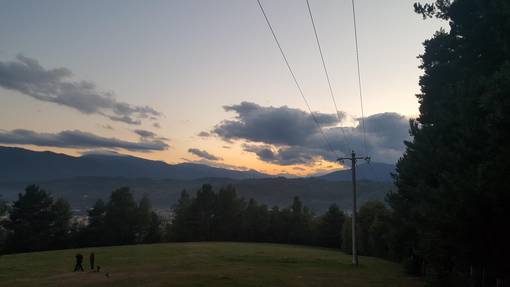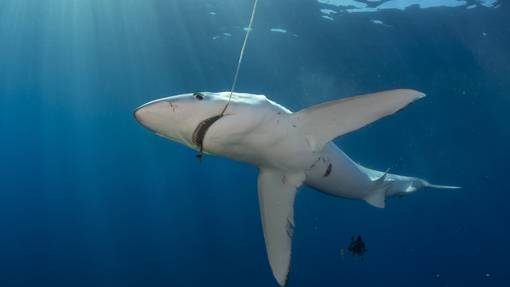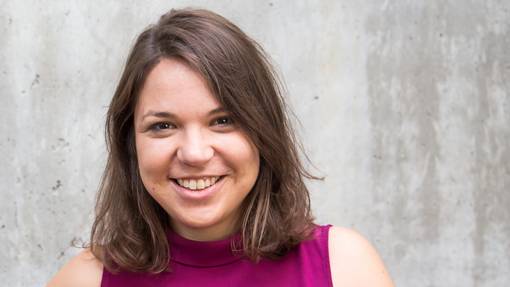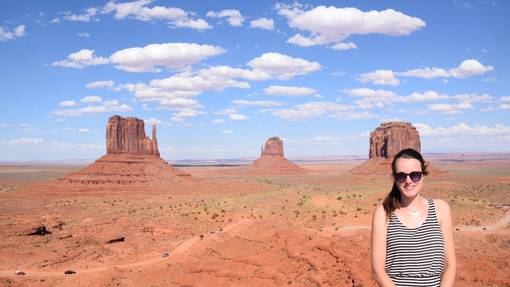#Auslandsaufenthalt #Wissenschaft
It can be as simple as a gesture
Arie Maeve Brückner, B-MINT-Stipendiatin
An ERASMUS semester in the midst of a pandemic in a country that is currently putting itself back together as a new non-EU state? I did have my doubts (even after landing) of how my expectations of an exchange semester, after hearing “life-changing” stories from friends, could be met in these extraordinary times. An online semester in a new city in the Scottish winter was a daunting prospect after what had already been a year and a half of social isolation. But after many accounts of how charming the Scots are and how breath-taking the Highlands are I could not turn down the opportunity. So, on the 4th September 2021 I boarded my flight bound for Glasgow with the hope that the Scottish reputation of a welcoming nature held true.
It is often a wish one has when going abroad, aside from seeing the sites, tasting delicacies and escaping the mundane, to find connection with people one has not yet encountered. We seek similar mindedness, people on our wavelength – we seek the feeling of home in other people, especially when away from home. This idea of connection and community in both the physical sense of the coming together of like-minded people and the feeling this coming together creates, is something that accompanied me throughout my time in Glasgow through a large array of experiences. When brainstorming ideas of how my time in Scotland could fall under the heading of “Was zählt” it occurred to me that as we find ourselves in the midst of the 4th COVID-19 wave and a tale of community and togetherness could offer a positive point of reflection.
The first contact with this feeling arose through a small gesture. Upon arrival in Scotland my partner and I hired a (huge!) van with which we set off on an unplanned 6-day trip from Edinburgh to wherever the roads through the Highlands took us. Turns out these roads took us along incredibly narrow, windy paths that for some inexplicable reason were designed for two-lane traffic. After the first double-decker bus came roaring past, narrowly missing our side-mirror and causing our whole van to shudder, we realised this was going to be a somewhat nerve-wracking journey. Thankfully, upon further narrowing of the roads there were passing places every couple of hundred meters in which one could pull into to allow oncoming traffic to pass. To my surprise this little to and fro with other drivers became a highlight of the week. Every time we would allow other drivers to pass, they would look over, smile or nod and give a wave. This wave varied between individuals with some fully raising their hand whilst others would lift two fingers from the wheel and keep it short. Regardless of the wave-style, passing drivers would acknowledge one another. This regular little greeting had something very merry and accepting about it. It was quite astounding how chuffed both my partner and I were about this little engagement and realised that during of a year of lockdowns we were used to avoidance and distance to strangers initially on a physical level but due to the duration of it all, that this eventuated to an emotional feeling too. This little gesture of a wave upon passing made us feel more connected to those sharing a road with us than what we had felt to those in our surroundings for a considerable time. So just as a gentle reminder, do not underestimate the importance of these small gestures!
This feeling became increasingly apparent when settling into Glasgow. Due to my concern that an online semester could hinder the process of meeting fellow students ‘naturally’, I decided to join one of Strathclyde University’s societies. These are student run bodies that seek members that share the same hobby, interest, or goal and the list of options is huge, ranging from cheerleading, anime, debating all the way to 3D-printing. Whilst all our university courses were online, everything else in everyday life was able to take place in person (the logic still escapes me), therefore these societies were able to meet regularly for their chosen activities. With the wish to see more of what Scottish nature had to offer I joined the Mountaineering Society and was delighted to discover that a hike up Ben Arthur at the head of Loch Lomond was planned for the second week of the semester. After kitting myself up with multiple layers of waterproof gear (that my new housemate was kind enough to lend to me) I set out with 60 fellow hikers, skill level ranging from ‘never seen a mountain’ to ‘let’s just run up’. The vast majority were newcomers and as we trudged up in pouring rain many questions of “what do you study?” and “where are you from?” could be heard as initial strangers began to become acquainted with one another. Some stretches of the journey proved challenging with sections of rock-climbing involved but never was there any hurry and if uncertainty was seen there was quickly a hand offered to pull you up. At the summit a view of roughly 30cm from the tip of your nose was visible due to a thick fog that had settled in. Despite this morale remained high, which I found very impressive considering the majority were soaked through and many were not even in proper hiking boots. At the base we were treated to the most glorious view of Loch Lomond with the clouds parting upon our arrival and the sun streaming down and scattering across the water. Much happy chatter ensued as bodily-tired but mentally-satisfied people shared stories about how they experienced the day’s adventure. This openness, encouragement, and willingness to help that I experienced on this first hike was gifted to me on every subsequent trip I shared with this group throughout the semester. Our Wednesday meetings at the local climbing gym became a highlight of my week as friendships and muscles were strengthened as we hauled each other up overhangs and tricky routes.
As is so often the case we only notice and appreciate something when it is no longer present. This absent feeling of community and togetherness, be it in the workplace, your favourite Zumba class or little techno club around the corner, is a widespread phenomenon in our current pandemic plagued present. Students entering their 4th online semester could certainly sing you a song about it. Who would have thought we would miss attending early morning lectures? As opposed to seeing my fellow biomedical science students half-asleep sipping coffee in the back row of the lecture theatre I see their names printed in white against a black background. This is a recurrent theme for multiple daily zoom calls from Monday through to Friday.
A more surprising absence of togetherness that I experienced in Scotland was when Glasgow took to centre stage. Pam Duncan-Glancy (a Labour MSP) observed that “at a time when the eyes of the world are on Glasgow, the very people who live and work here are being totally forgotten about”. Welcome to Cop26, the UN Climate Change Conference. A global conference that “unites the world” and “brings parties together” proved very exclusive for those who did not arrive by private jet. With the majority of proceedings organized from 10 Downing Street, the citizens of Glasgow were subjected to what felt like a raid of the city. Enormous amounts of police and security swarmed the streets, by car, by bus and by helicopter. Extensive amounts of roads were blocked off with concrete blocks and were heavily controlled. These detours forced many Glaswegians to walk home from work through dark, unlit parks but when voices (mainly from women) were raised concerning fears for personal safety these citizens were met by deaf ears from the council. Days before conference begin the city became decorated with “green” projects, my personal favourite was the “wee forest” that was planted in front of my apartment. Hundreds of little seedlings were planted on a bedding of woodchips under the guise of a community initiative but when my housemate and I inquired with the planters we took to be volunteers, we were informed this “initiative” was funded and organised by Blackrock Inc. – a multinational investment cooperation. In addition to the exclusion from their city, Glaswegians were forced to look on as Cop26 guests were granted wishes they had long been campaigning for. Wishes that would then be revoked at the completion of the conference. A perfect and very frustrating example is public transport, a topic that gained sudden attention as international guests were to be greeted. In Glasgow the subway only runs until 6pm on a Sunday – a tender subject. The different fractions of transport, bus, subway and regional train all require different public transport tickets – again another tender subject. During Cop26 the Subway trading hours were extended until 11pm and all guests were given an all-inclusive bus, train and subway card. This card has since been removed and was never available for Glasgow citizens. The subway trading hours have also returned to 6pm closure on Sundays.
Despite the organised exclusion and intimidating security presence in the city there were still triumphant displays of mateship. During Cop26 Airbnb prices shot up from 40-50 pounds per night to an extortionate 500+ pounds per night, even in the less attractive suburbs. Many youth activists and representatives from the Global South found themselves unable to cater to these obscene figures and were forced to seek shelter elsewhere. The demand for accommodation was met not by hotels or by the council who put up wealthy guests in a docked cruise ship but by the citizens of Glasgow. I had the pleasure of meeting a Glaswegian flat of 4 students that offered their couch, camping mattresses and anything remotely comfortable to two groups of activists from the United States and Scotland for the duration of their stay. Whilst dining with them one evening and listening to tales of their experiences as conference volunteers one anecdote has stuck with me. A Zambian delegate was warned of the rainfall in Glasgow but not of the cold conditions. He arrived with no shoes and no winter coat as a result. The story they told me over dinner was how both items of clothing were organised for him by these volunteers so that he would be able to take part in the conference’s proceedings in comfort. And if I had any doubt that a sense of community had deserted Glasgow during Cop26 I just had to walk out my front door on the 6th of November 2021 and join the estimated 250 000 citizens (of the world) raising their voices in unison, demanding more of the representative bodies, in the fight for climate justice.
Upon reflection, the sense of community or absence thereof does not require doing a stint abroad to be experienced. However, in our everyday lives we fall into our routines, share our space with familiar faces and often attempt to avoid encounters with strangers if possible. Finding myself in a situation where I was dependent on the kindness of strangers, be it to forge new friendships or simply to ask for directions, I realised again the difference an act of compassion or recognition can have on another – even if it is just a wave!
Artikel kommentieren
Kommentare sind nach einer redaktionellen Prüfung öffentlich sichtbar.

